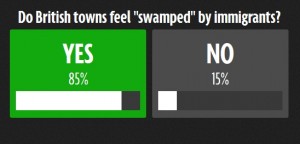Economic warfare against Britons by the Westminster Puppet – a taboo subject
The Tory Defence Secretary, Michael Fallon, came under fire this weekend from the thought-control apparatus of the British Marxist state when he said that British towns ‘felt under siege’ from EU immigrants. It is true to say that this is the sort of utterance that UKIP has learnt to try and steer well clear of in its official expressions and interfaces with corporate-media consumership, fearful that it would be fodder for pretend-liberal-authoritarians to beat them up with. Nevertheless, Downing Street let it be known that Fallon’s was a bad choice of language, and at the same time in several state-controlled places on the internet, it was labelled as being of UKIP (see here and here for example). In other words there was an effort made to stigmatise the phraseology, and to have that stigmatisation stick to the mortal enemy. This could only be expected. For the truth of the matter is that, although UKIP won’t even talk about it, Britons are being subjected to a kind of no-bullets warfare – executed through the economic outcome of EU legal supremacy and EU immigration – that is designed to bring an occupied people – the British – to a point of being completely dominated. It is only natural that the British Government would want to censure any semblance of the expression of the idea, for the British Government never wants the truth of its unlawful activity to become common knowledge, or any language properly describing it to become common currency.
All things being considered, it is probably the case that Fallon’s words had had the official go-ahead from the Tory HQ for the purposes of programming his audience and in order that the resultant demonstration of censure, and a complimentary faux-outrage on social media, be triggered. (It is telling that the word ‘swamped’ – one that Fallon also used – seems to be attracting most of the vitriol – it is clearly a tradional trigger word that has been used to feed conditioning about another hitherto neutral word).
The strategic advantage to the British Government of there being a taboo about the appalling conflict of attrition waged against Britons is that no one talks about the facts around the idea – it’s quite obvious. At a time when it is imperative that Britons wake up to how the British Government has become a puppet of powers that the British Constitution expressly forbids, the Government naturally doesn’t want Britons joining the dots. But the undeniable fact of the matter is that the British Government is a vassal government that occupies Westminster, and therefore the entire land, on behalf of offshore interests. The EU is the overt power that rules through the British puppet – although in truth there is a shadowy conglomerate of extra-national corporate and financial powers that uses the EU as cover to regulate a British soviet for the purposes of control for gratuitous self-enrichment. However, it suffices to identify the EU as the power holding the reins, and this is a tangible reality that is clearly evident in the EU treaties, as well as the plethora of both official and off-the-cuff bragging that EU honchos have made about an EU superstate.
Obviously, while there is a threat of the British People becoming aware in sufficient numbers of the situation abovementioned, there is always a danger to the puppet government – who would expect to be punished. Unlike the Normans, this modern invader may have cut the head off the old country, but it didn’t do it through military dominance; it doesn’t have the traditional means to guarantee that any revolt against it will fail. This is why measures have been taken to compensate – namely, the opening of the borders to the European continent, and in particular, the poverty-stricken post Warsaw Bloc countries of Eastern Europe.
The great lie about EU expansion into Eastern Europe told by the puppet government at Westminster was that no one expected such a massive influx of people from Eastern Europe. (While on this point, please note that the official statistics do not do the situation justice. Even in the first few years, Polish immigration on its own was in the hundreds of thousands. There have to be millions of Eastern Europeans in Britain). Part of the big lie was to pretend that when the EU met the old Warsaw Pact countries, it was Western economic culture that was colonising the East. In fact, what really happened was the Warsaw Pact territories, now dislocated from Russia of course, expanded into the West. And leading up to this event, the economic terrain in Britain, without people even realising it, had been terra-formed to accommodate the communist East. It was tantamount to opening up virgin territory into which the people of the East could colonise. It is here that America offers an appropriate comparison (it was UKIP’s Gerard Batten who pointed out that Britain wasn’t the 19th century Wild West). When first the pilgrims and then the pioneers settled America, they were moving into a land that was already occupied by a relatively indigenous people. The difference between the two was that the English settlers had a concept of ownership of land whereas the Indians did not. These days, the Eastern Europeans who come to the UK are facing a similarly disadvantaged native. Britons do not understand the context of the mass movement of people into their nation which is this: Britain has become the most prosperous Soviet welfare state. People who were collectivised and controlled by government for generations in the East have been told that they can now claim entitlement (not property this time) in the new territory, and the entitlement is worth slightly more in the new land. And so they come.
To collect this together, then, in order to deal with the threat of the angry hordes of Briton, and therefore the threat to itself, the vassal British government has had by necessity to import a client population (with voting rights at local level – the pathway to direct governance by the EU) who were not only encouraged to see Britain as an extension of their own country, but who could recognise it as such. Although many Britons recognise this as having all the trappings of an invasion, not many vocalise that recognition out of fear of being slapped down as an extremist. In truth, the invasion itself will not deliver the coup de grace to the British nation; nothing about killing the United Kingdom has been shockingly immediate – the game has always been about slowly catching the monkey. Likewise, the invasion is in fact a platform built stealthily, upon which siege economic warfare can be waged.
Economic warfare is all about limiting the economic activity of an enemy; to weaken it through restricting its ability to operate against one’s own interests. There are certain traditional ways that this is done. Consider first the denial of economic capacity to an enemy, and think about the closure of UK power stations that many commentators say is going to precipitate an energy crisis – and very soon. In a war, one side would bomb the other’s factories. In the EU, the vassal government merely had to cave in to a diktat from Brussels; and in fact, the UK has suffered from this on a catastrophic scale and for a long time – see the Thatcher government era shutdown of British heavy industry.
That being said, the focus is on the economic attack that mass immigration represents. So consider economic warfare as done by blockade – or besiegement (sanctions are the equivalent in an undeclared war). There is also preclusive purchasing, where one side buys from a third party all the stock of something required by the enemy so that the enemy is denied this stock. As surprising as it may be to the reader, these very tactics are being subjected in an applicative way to Britons. To explain: the British Government can be said to have ‘bought’ much of the stock of low-skilled work places in return for supplying that low-wage labour force. Hundreds of thousands of low skilled labour jobs are now denied to British people. The same can be said of a rightful share of the welfare pot – if it is taken up by immigrants who never put in, Britons who did are denied it.
The other tactic of economic warfare follows from this situation; when Britons do not have work to purchase goods and services, then they are effectively being blockaded from normal trade activity – they are not able to operate optimally and they are permanently weakened and contained. Of course, besiegement ends when the besieged gives up, and surrendering in this case means giving up economic independence and capitulating completely to the whim and dictate of government officialdom in return for scraps. Slavery.
Of course, some may say in criticism that ‘it is a dog-eat-dog world and that these economic battles are ones being faced by individuals. As hard as their suffering may be, in general immigration is good for the British economy’. Unfortunately, this is not true at all; there is a very generally damaging effect on the entire economy caused by immigration from the EU. Even a rudimentary understanding of the mechanics of a national economy reveals the methodology – if only more Britons would acquire one. This author was able to glean his from a man who by his qualifications and his Nobel Prize should know what he is talking about:
In a depression… interest rates cannot be cut.
So there is no channel through which lower wages can raise employment! And the likely effect of wage cuts is in fact to reduce employment.
Why? Debt… When individuals have run up debts that are now considered excessive, these debtors end up being forced to slash spending in order to pay that debt. Meanwhile, creditors face no comparable pressure to spend more. So debt… creates a ‘deleveraging’ environment in which overall spending is depressed, possibly depressed enough to cause a depression.
In such an environment, what happens if the level of wages falls? Prices and incomes fall too – but debt does not. So the real burden of debt rises, reinforcing the depressing effect of debt on spending. This means that having ‘flexible’ labor markets, in which wages fall quickly in the face of unemployment, is actually a bad thing under depression conditions.
Paul R Krugman; Economics for the Curious: Inside the Minds of 12 Nobel Laureates (p15/16); January 2014
Britain entered a depression in 2008 – it’s one that experts believe the country never left. Even laymen can see that the much vaunted recovery is merely a corporate buoyancy surrounding the sub-prime mortgage scam being operated by the Coalition. Between 2008 and the present day, millions of Europeans have entered the country. This has had a deflating effect on wages. In addition, the debt burden has grown worse, and interest rates are set to rise, not be lowered. The result will be less employment, less investment in the economy, more failure, and a downward economic spiral. Everyone suffers, not just individuals who are competing with immigrants for low wage jobs.
The reality of the warfare being perpetrated on the Britons by the vassal government at Westminster is precisely why there is a great insistence that the subject not be discussed, and language that describes its reality is rapidly denounced as being prejudiced and almost immoral. However, the outrage being perpetrated by the British Government cannot be hidden from wider appreciation as the general topic of immigration has historically been, and patriots have a duty to make sure it does not. The attack on Britons by their government needs to be talked about so that it can be defended against – ultimately by the removal of the LibLabCon (at the 2015 General Election preferably) from its hitherto permanent office of government. And please note, to recognise EU immigration as a weapon against Britain is not the same as stigmatising EU immigrants. It does mean, however, that in the end, the weapon must be removed in order for the wound to heal, and there are civilised and reasonable ways to do this. This topic must also be talked about in an open way. There needs to be a rational debate so that realistic choices can be made about which people should have leave to remain after the EU treaties which have legalised their sojourn have been revoked, and which cannot. Political pressure that results in any crucial topic having to be discussed in some coded fashion is exerted exactly because of that outcome; any utterances become grist to the mill of people who want the failure that full exploration of the topic would otherwise avoid – and this, above all else, needs to be in the forefront of the minds of those doing battle to restore economic health to Britain, and economic independence from the State to Britons, and, of course, who want human beings from other places than Britain to be treated fairly according to the British tradition.
Pertinent quotations:
“The Bank of England cut interest rates to 0.5% in early 2009, and has kept them at this record low ever since.”
Source: BBC
“UK household debt has more than quadrupled since 1990, despite interest rates being at historic lows, a new report out today has showed.
“The study came with a warning that the high levels of debt being serviced by Britons posed a ‘serious threat’ to the economic recovery, especially as rates are due to start rising next year.
“In 1990, total household debt in the UK stood at £347billion, but it soared by 314 per cent to £1,437billion in 2013, with people in their thirties and forties carrying most of its weight, according to financial research firm Verum.”
Source: ThisIsMoney.co.uk 14 August 2014
“On the impact of immigration on average wage levels, the evidence is again inconclusive (5.1), but there is a strong consensus of opinion that immigration has harmed the earnings of the most poorly-paid UK-born members of the labour force (5.2)”
Source: MigrationWatch
“Between 1995 and 2010, the [Migration Advisory Committee]…found an associated displacement of 160,000 British workers. For every additional one hundred immigrants, they estimated that 23 British workers would not be employed.”
Theresa May, 2012
Source: BBC



















